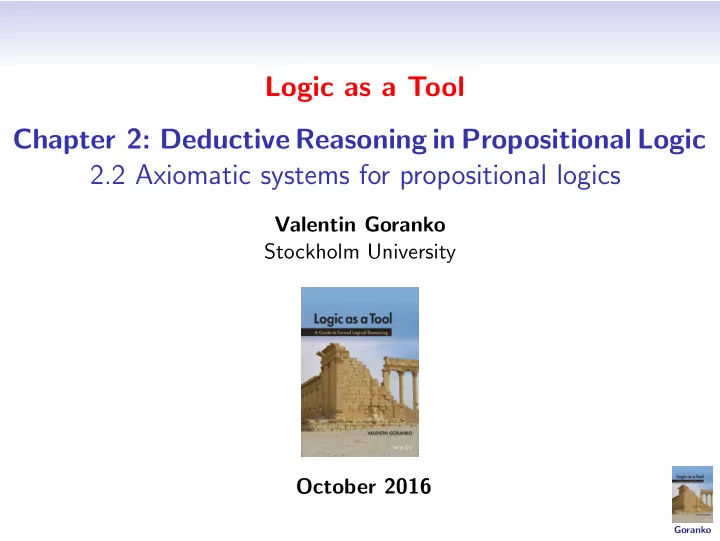

Logic as a Tool Chapter 2: Deductive Reasoning in Propositional Logic 2.2 Axiomatic systems for propositional logics Valentin Goranko Stockholm University October 2016 Goranko
Hilbert-style axiomatic systems • Based on axioms (or, axiom schemes), and only one or two simple rules of inference. • Relatively easy to extract from the semantics and reason about. In particular, suitable to do induction on derivations. • Practically not very convenient and useful, because the derivations are not well-structured. • In particular, not suitable for automated reasoning. Goranko
The axiomatic system H for the classical propositional logic We assume now that the only propositional connectives in the language are ¬ and → , while others are defined in terms of them Axiom schemes for ¬ and → : ( → 1) A → ( B → A ); ( → 2) ( A → ( B → C )) → (( A → B ) → ( A → C )); ( → 3) ( ¬ B → ¬ A ) → (( ¬ B → A ) → B ) . The only rule of inference: Modus ponens: A , A → B B Goranko
Adding axioms for ∧ and ∨ to H Axiom schemes for ∧ : ( ∧ 1) ( A ∧ B ) → A ; ( ∧ 2) ( A ∧ B ) → B ; ( ∧ 3) ( A → B ) → (( A → C ) → ( A → B ∧ C )) . Axioms schemes for ∨ : ( ∨ 1) A → A ∨ B ; ( ∨ 2) B → A ∨ B ; ( ∨ 3) ( A → C ) → (( B → C ) → ( A ∨ B → C )) . Goranko
Derivations and deductive consequence in H A formula A is derivable in H from a set of assumptions: Γ, denoted Γ ⊢ H A , if there is a finite sequence of formulae A 1 , ..., A n , such that for every i ≤ n : A i is either an instance of an axiom of H , or a formula from Γ, or is obtained from some A j , A k for j , k < i , by applying the rule Modus Ponens. A is a theorem of H if ∅ ⊢ H A , also denoted ⊢ H A . Adequacy of H : The axiomatic system H is sound and complete for the classical propositional logics: Γ ⊢ H A iff Γ | = A . Goranko
Deductive consequence in H : inductive definition Inductive definition of Γ ⊢ H A : 1. If A is an axiom then Γ ⊢ H A . 2. If A ∈ Γ then Γ ⊢ H A . 3. If Γ ⊢ H A and Γ ⊢ H A → B then Γ ⊢ H B . Goranko
Derivations in H : example Example: ⊢ H ( p ∧ ( p → q )) → q : 1. ⊢ H ( p ∧ ( p → q )) → p , by Axiom ( ∧ 1); 2. ⊢ H ( p ∧ ( p → q )) → ( p → q ) , by Axiom ( ∧ 2); 3. ⊢ H (( p ∧ ( p → q )) → ( p → q )) → ((( p ∧ ( p → q )) → p ) → (( p ∧ ( p → q )) → q )) , by Axiom ( → 2); 4. ⊢ H ( p ∧ ( p → q )) → p ) → (( p ∧ ( p → q )) → q ) , by 2,3 and Modus Ponens; 5. ⊢ H ( p ∧ ( p → q )) → q , by 1,4 and Modus Ponens. Challenge: Derive ⊢ H p → p . Goranko
The Deduction Theorem Deduction Theorem: For any set of formulae Γ and formulae A and B : Γ ∪ { A } ⊢ H B iff Γ ⊢ H A → B . Proof: Right-to-left: Straightforward, by Modus Ponens, because if Γ ⊢ H A → B then, moreover, Γ ∪ { A } ⊢ H A → B . Left-to-right: Induction on the derivation Γ ∪ { A } ⊢ H B , using the axioms for → . Exercise: complete the details. Goranko
Using the Deduction Theorem: example 1 ⊢ H ( p ∧ ( p → q )) → q revisited: 1. p ∧ ( p → q ) ⊢ H p , by Axiom ( ∧ 1) and the Deduction Theorem; 2. p ∧ ( p → q ) ⊢ H p → q by Axiom ( ∧ 2) and the Deduction Theorem; 3. p ∧ ( p → q ) ⊢ H q by 1,2, and Modus Ponens; 4. ⊢ H ( p ∧ ( p → q )) → q by 3 and the Deduction Theorem. Goranko
Using the Deduction Theorem: example 2 p , ¬ p ⊢ H q : 1. ¬ p ⊢ H ¬ q → ¬ p , by Axiom ( → 1) and the Deduction Theorem; 2. ¬ p , ⊢ H ( ¬ q → p ) → q , by 1, Axiom ( → 3), and Modus Ponens; 3. p ⊢ H ¬ q → p , by Axiom ( → 1) and the Deduction Theorem; 4. p , ¬ p ⊢ H q , by 2,3, and Modus Ponens. Goranko
Recommend
More recommend